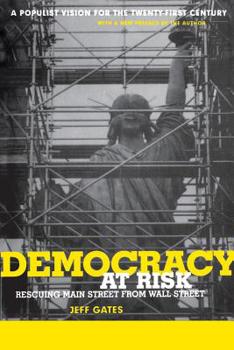Democracy at Risk: Rescuing Main Street from Wall Street
Select Format
Select Condition 
Book Overview
"A bible for a powerful populism that will arise after the latest Gilded Age is over. Read it and run, or read it and recover your sense of what it could mean to actually live in a democratic society." -- Paul Hawken, author, Natural Capitalism and The Ecology of Commerce " Gates] offers an ambitious "populist vision." You may not like its answers, but you can't ignore the questions." -- Cheryl Dahle, Fast Company "A...
Format:Paperback
Language:English
ISBN:0738204838
ISBN13:9780738204833
Release Date:April 2001
Publisher:Basic Books
Length:464 Pages
Weight:1.45 lbs.
Dimensions:1.0" x 6.0" x 9.3"
Customer Reviews
2 ratings
Broadening the Ownership of Capital
Published by Thriftbooks.com User , 16 years ago
Jeff Gates met Lou Kelso while Jeff was in law school, where he wrote articles about Lou's ideas for his law school newspaper. At Lou's suggestion, Jeff worked on Stuart Speiser's book, A Piece of the Action. Jeff then went on to be counsel for Russell Long's Senate Committee on Finance during the 1980s, where "I crafted much of the federal legislation encouraging employee stock ownership plans." He became special counsel to Kelso & Company and has since been a consultant to governments and other organizations on "ownership engineering." His books are The Ownership Solution: Toward a Shared Capitalism for the Twenty-First Century, Addison-Wesley, 1998 and Democracy at Risk: Rescuing Main Street from Wall Street, A Populist Vision for the Twenty-First Century, Perseus, 2000. In The Ownership Solution, Jeff suggests "a steady broadening of ownership, in the knowledge that a vigorous effort in that direction will, in time, correct the current concentration." Beyond the economic effect, he sees shareownership "as a social tool for linking people not only to things (productive assets) but also to each other, to their community and (importantly) to their endangered environment." Jeff presents a clear, compelling analysis of the current ownership of financial assets and the "closed system" of business finance. However, he does not believe that new shareowners will be created if shares must be purchased "from their already stretched paychecks." He argues that the "best way . . . is for government to intervene with a foresighted policy environment that induces capitalism to create a broader base of capitalists." Examples from his own consulting work are ESOPs and extensions to RESOPs (Related Enterprise, such as a company's vendor's employees); CSOPs (Customer) and GSOP (General, "in which ownership is based on geography or citizenship.") Jeff uses his experience in federal government policy to suggest "twelve areas where the government's presence could be retooled to broaden ownership." They include favoring companies with ESOPs or "certifiably broad-based ownership" in making government purchases, licenses, access to public property, trade assistance, loans and loan guarantees, public pension plan investments and antitrust enforcement. He adds ten changes in taxation "to foster broad-based capital accumulation," as well as a "major education and communication campaign to better school citizens about finance, business and the various paths to ownership." Combined, all of these measures are to achieve "a `critical mass' of encouragement so that the current closed system of finance (which concentrates ownership) becomes less attractive than financial techniques that broaden ownership." In Democracy at Risk, Jeff describes the current "people-disconnected capitalism" and argues for a "people-responsive economy." In chapters like "Killer Capitalism," he documents many of the negative effects on people and our environment from poverty
Democracy as if People Matter
Published by Thriftbooks.com User , 23 years ago
Jeff Gates is clearly a powerful thinker and a thoughtful human being. He writes with conviction and credibility. He knows what he's talking about. He was the consummate 'insider', having spent more than a decade on Capital Hill as counsel to the Senate Finance Committee. DEMOCRACY AT RISK provides stark evidence that 'we the people' are no longer citizens who are served by the 'common good'. Instead, we are 'consumers' being herded and manipulated to serve an all powerful 'marketplace' and the small number of people who have become obscenely wealthy as a result. For example, 70% of all earnings growth in the U.S. since the 1970's has gone to less than 1% of the people. Gates says that highly concentrated wealth patterns aren't forces of nature: they're political choices. We can choose something quite different and far more inclusive - provided we're offered that choice. Gates calls for a society built on a more natural, caring form of capitalism, with broad ownership patterns. Gates argues that this 'populist' agenda is neither liberal or conservative; Democratic or Republican. It's about restoring a democracy that is badly broken. It's about removing corruption from a political system awash in influence money. He does not suggest making things right will be easy; only that it is necessary. If you want to understand the powerful, largely hidden forces shaping our society; if you want a vision for something better; if you want to be part of the solution, read this book.





